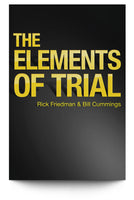One of America's leading litigators, and Trial Guides' bestselling author, Rick Friedman brings you the first practical text on the fundamental skills you need to know when handling a trial. With trial experience increasingly rare, The Elements of Trial provides a concise guide for law professors, law students, and every lawyer preparing for trial.
This book offers invaluable advice on the following aspects of trial:
- Investigating your case
- Interviewing and preparing witnesses
- Organizing trial notebooks, discovery information, trial briefs, and exhibits
- Creating a theme
- Choosing or drafting jury instructions
- Asking questions of the court clerk and judicial assistant
- Framing your case-in-chief
- Filing motions in limine
- Pretrial hearings
- Making objections and understanding juror perceptions about the use of objections in trial
- Bench conferences
- Moving exhibits into evidence
- Voir dire (including your purpose beyond cause and peremptory challenges)
- Opening statement (structure, themes, establishing credibility, and what you should never do)
- Direct examination
- Cross-examination (constructive and destructive)
- Making a record
- Directed verdict/motion for judgment as a matter of law
- Rebuttal case
- Charging conference
- Closing argument
- Taking the verdict and polling the jury
- Posttrial motions
- Your impact on the trial
The book also explains the applicable law related to each part of trial and offers ways to effectively implement the techniques and methods that Friedman and Cummings present.
*This book is available for $45 for New Lawyers and Law Students who have been accepted into our New Lawyers Program. Please call our office at 800-309-6845 to receive this exclusive discount.
- Publisher's Note
- Acknowledgement
- Introduction
- An Overview
- Jury Instructions
- Investigation
- Fighting Chaos
- Assessing Your Case-in-Chief
- Trial Briefs and Motions in Limine
- The Pretrial Hearing
- Jury Selection (Voir Dire)
- Opening Statement
- Presenting Your Case-in-Chief: Direct Examination
- Cross-Examination
- Making a Record
- Directed Verdict
- Rebuttal Case
- The Charging Conference
- Closing Argument
- Jury Questions and Taking the Verdict
- Posttrial Motions
- You
- Conclusion
- Index
- About the Authors
What Legal Leaders Are Saying
— David Ball, author of David Ball on Damages 3 and ReptileFrom all that law-school stuff, this nifty book distills the essentials (and adds to them) that new trial attorneys need before their first cases begin. A clear, concise checklist organized for every stage of trial, and quickly read, Friedman and Cummings’s fundamentals and wisdoms start new lawyers off in the right direction and help keep them there. I suggest a triple reading before your first case and thorough reviews before your next half dozen. You’ll learn how to be professional when you’d otherwise still be an amateur.
— Jim Perdue, member of the Inner Circle of Advocates, author of Winning with Stories, I Remember Atticus, and Who Will Speak for the Victim?Rick Friedman and Bill Cummings’s recent The Elements of Trial is an excellent resource to assist law students and lawyers [to] understand the basics of an American trial. These experienced and esteemed authors provide an analysis and exploration of all stages of both civil and criminal trials, and offer valuable suggestions that will help any active litigator improve their practice.
— Larry Roberts, trial attorney, TennesseeLaw schools should make The Elements of Trial required reading for every law school student! An easily understood and informative explanation about each step of the trial process, it is a valuable reference and learning source for both the experienced and aspiring trial lawyer!
— Spencer Pahlke, lecturer and director of Trial Competition Teams, UC Berkeley School of LawThe Elements of Trial is the missing manual on trial practice. While there have been basic questions about trial practice for as long as the jury system has been in existence, there has never before been so concise and authoritative a how-to guide as Rick’s newest book. In Rick’s usual style, The Elements of Trial is direct and unassuming, full of both wisdom and nuts-and-bolts explanations of how to try a case. To the reader, it is as if Rick is serving as a personal trial advocacy teacher, replacing the young lawyer’s usual supply of uncertainty and fear with support and guidance. I look forward to using The Elements of Trial with my students for years to come.
— William S. Bailey, professor from practice, University of Washington School of Law, author of Show the Story: The Power of Visual AdvocacyUp until now, there has been a deep, mutually exclusive divide between trial practitioners and law school teachers of trial advocacy, with both camps thinking that the other does not offer them much of value. In truth, a collaborative dialogue between these two worlds would lead to much more dynamic, integrated learning opportunities. That is exactly why Elements of Trial is such an exciting breakthrough book, geared both to training with the legal academy and in continuing education circles. It is the mark of a master teacher to write with the needs of the target audience firmly in mind, focusing on knowledge critical to understanding the subject. Rick Friedman is not only an outstanding trial lawyer who has had astonishing success in courtrooms across the United States, but also an acclaimed author on trial techniques. He is one of those rare practitioners with the gift of identifying and distilling critical information on pretrial and trial techniques into simple, easy to understand units. Mr. Friedman and his coauthor Bill Cummings have collaborated to produce an instant classic, written and edited with scrupulous economy, leaving the reader with a deep awareness that otherwise would take years of experience to achieve, if at all. The Elements of Trial is a book that reaches across the aisle and offers something for everyone. I enthusiastically recommend it, particularly looking forward to what it will bring to my classrooms.
— Robert Spohrer, member of the Inner Circle of Advocates, listed in Best Lawyers in AmericaIn the toolbox of all the trial advocacy books, this stands out as the Swiss Army knife. It’s all here, from initial client interviews to posttrial motions. Each chapter takes an element of the trial and clearly sets out what to do, how to do it, and why it’s important. Whether you are a recent graduate preparing for your first trial or a veteran of the courtroom, this practical guide to success belongs in your trial bag.
— Carol Anderson, clinical professor at Wake Forest University Law SchoolRick Friedman’s new book is, in a word, superb. It is everything that a trial should be: short, succinct, and full of useful information. Rick doesn’t waste any time with platitudes: his ideas are fresh, original, and thoughtful. This book will show you how to try a case from start to finish. If you follow Rick’s advice, you should be able to win more cases for your clients—even if you’re a novice. But make no mistake—this book isn’t just for the novice. It’s a must-read for anyone who is serious about becoming a better advocate. I just wish I had written it!













 View Excerpt
View Excerpt